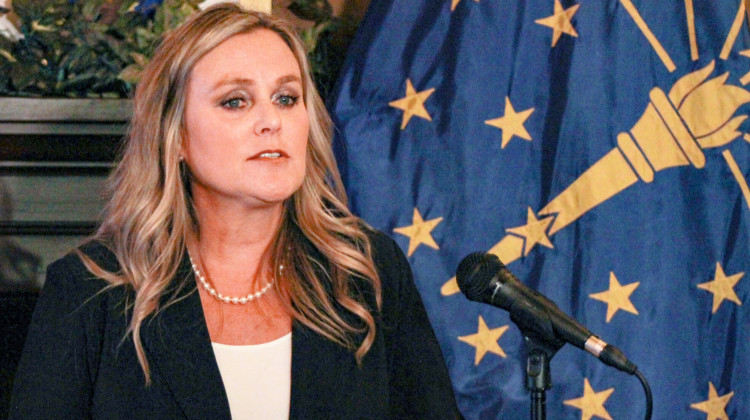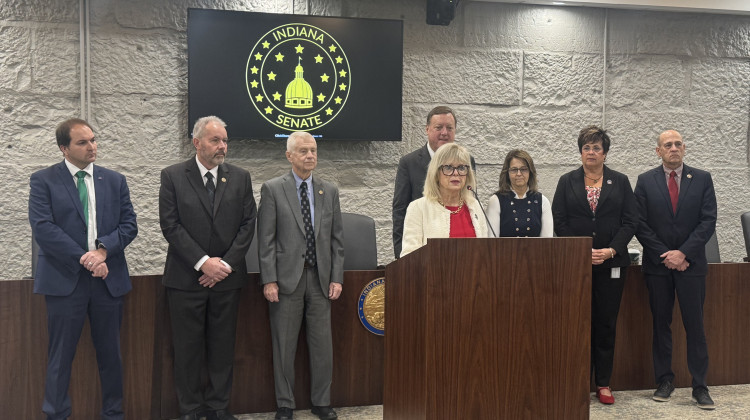
Former State Superintendent of Public Instruction Jennifer McCormick talks during the launch of her campaign for governor in May 2023. McCormick, who served in office as a Republican, is running as a Democrat.
Brandon Smith / IPB NewsWhen Indiana voters head to the ballot box in November, they will select a leader to replace outgoing Gov. Eric Holcomb and take control of the state’s education priorities.
The next governor will oversee a state budget with nearly half the funds directed to K-12 schools, and have the power to appoint a secretary of education who operates the Department of Education and sits on the policy-making State Board of Education.
Former state superintendent Jennifer McCormick, who was endorsed by the political action committee of the state’s largest teachers union last month, switched from the Republican party to the Democratic party following her term in 2021.
Ahead of the May 7 primary, WFYI asked the sole Democratic candidate for governor five questions about topics from early childhood education and leadership of the Department of Education. Read responses from the GOP candidates for governor here.
McCormick shared some of her plans for educating the state’s children. Here’s how she responded.
Answers were limited to 200 words or less, and were edited for length and clarity.
If elected, your office could change the Department of Education’s direction, and even its leader. If necessary, how would you alter its path?
Jennifer McCormick: As governor, I will prioritize kids by staffing state agencies, key positions, and boards with competent and proven individuals. This includes the Department of Education. I will also ensure our state agencies work together rather than in silos. The Department of Education will be responsive, competent, and follow a customer service approach of support-and-guide versus control-and-command.
The Department of Education will operate using good governance — transparent, timely, and accountable. Federal and state grant monies will be distributed in a lawful, purposeful, timely, and targeted manner supporting innovation, creativity, results, and needs. I will also re-establish support regarding attendance, social, emotional, and behavioral resources.
In addition, the Secretary of Education and State Board members will be fair, competent, and advocate for kids. Loyalty to kids will come before loyalty to a political party or an extreme agenda. Indiana’s Secretary of Education will have local superintendent experience exemplifying proficiency in school finance, curriculum, instruction, and assessment, and the need for critical partnerships.
These are skills to be shared by those selected as State Board of Education members. Furthermore, the department will provide state-wide resources embracing effectiveness and efficiency. As proven while in office, student and parent's rights will be of utmost importance and protected.
Gov. Eric Holcomb along with state lawmakers launched educators into an overhaul of how children learn to read. Holcomb set a goal to have 95 percent of third grade students pass the state’s reading test by 2027. Under your administration, what literacy initiatives would you support?
McCormick: I will first examine the root cause of the literacy crisis. To do so, I will staff state agencies, key positions, and boards with competent and proven individuals. They will lead in the development of an extensive literacy plan which will be research-based and affordable in its implementation. Universities, research organizations, educators, literacy experts, and other proven collaborators will assist in achieving aggressive literacy goals. As part of this plan, I will also call for state-wide quality and affordable birth through age 3 localized programs, childcare, and universal pre-K, aligned with rigorous K-12 expectations.
To ensure program success, competitive starting salary expectations will be set for those responsible for delivering such a plan. This will assist in attracting and retaining the best professionals serving our kids and are charged with delivering successful literacy initiatives.
Indiana’s plan will be fully implemented and supported by utilizing current and future proven programs and aligned professional development, such as programs established by the University of Florida Literacy Institute. Lastly, as governor, student early instruction interventions will be prioritized and resourced accordingly within the plan. For decades, Indiana has woefully underfunded this effort which has a direct correlation with our dismal literacy rates.
Democratic state lawmakers have proposed investments in early childhood education, specifically universal pre-K, as a means to curb the state’s reading crisis in addition to other bipartisan changes like teaching the science of reading. What’s your plan for educating the state’s youngest children?
McCormick: As Superintendent of Public Instruction, I proved I will always prioritize kids. As governor, I will do the same by staffing state agencies, key positions, and boards with competent and proven individuals. They will lead the establishment of an early childhood service plan based upon a state-wide audit of programs and services serving birth through age 3, childcare, and pre-K.
Implementation of such plans not only improves a child's academic, social, and behavioral levels of readiness, but they also support a healthy and productive workforce, free of stressors associated with lack of childcare. Our team will align curriculum, instruction and assessment throughout early childhood into K-12. In order to have a robust system, we must also listen to our early childhood care providers regarding wages, working conditions, and needed resources.
Coupling this with proven early childhood curricular programs and staff training, our kids will achieve high levels of K-12 readiness. Local communities and state agencies will work together for more resource efficiency and effectiveness. Lastly, critical pieces that will also enhance efforts to serve our youngest include a more aggressive child-find program and partnering with healthcare providers serving our children as a trusted pipeline of information to parents and guardians.
Recent data from the Indiana Commission for Higher Education shows less high school students in Indiana are choosing to pursue post-secondary education with 47 percent of 2021 graduates not enrolling in college altogether. Those bleak rates could mean a need for innovation in what’s offered to students in high school. What, if anything, should Indiana need to invest in?
McCormick said she will staff state positions with “competent” people.
McCormick: This includes ICHE. As a former teacher, local school superintendent, and state superintendent, I know firsthand the systemic root causes needing to be addressed regarding this dire issue.
Reinventing school multiple times in five years, the constant change of assessments, the lack of Statehouse emphasis placed on higher education, and Indiana’s dismal approach to career exploration and coaching are all factors I will address in a collaborative, honest, and transparent approach. I will incentivize higher education exploration and participation. First-generation participation must be informed and aggressively supported.
I will also align state agencies that are responsible for such efforts and invite business, trades, K-12, and universities to the table for solutions. Incentive programs versus current punitive approaches at the local level will be implemented to assist in our efforts. I will use the governor’s platform and change the messaging of ‘just fill the jobs of today’ to a message of investing in our current and future workforce needs and empowering Hoosier prosperity.
Holcomb sought to increase teacher pay with the goal of raising the state’s average to $60,000 before he leaves office this year. Lawmakers brought up the bottom line for teachers’ salaries. What should take place so school districts are able to recruit and retain educators in the state?
McCormick: In order to truly address the teacher shortage, the starting salary must be a minimum of $60,000. This salary would be competitive with non-educators and present a viable professional option for Hoosiers. In addition, I will audit the ten-year trends of those individuals entering into our pre-service programs, the completion rate of those who start, and the retention of those at 3 years and 5 years in the field. My administration will set up a realistic and robust high school level transitional teaching program to culminate at the university level. Purposeful, diverse classroom experiences will be incentivized at the university level.
Our administration will invest in an aggressive teacher recruitment campaign through ICHE and IDOE. Our administration will also research and advance policies that incentivize individuals to enter the field of education and stay. Some of those programs include but are not limited to programs supporting teacher housing, tax incentives, dependent education discounts, child care assistance, state-mandated fee forgiveness, and loan assistance.
Far too often, teachers are leaving the field because of state mandates which can be unnecessary and unproductive burdens.
Rachel Fradette is the WFYI Statehouse education reporter. Contact Rachel at rfradette@wfyi.org.
 DONATE
DONATE






 Support WFYI. We can't do it without you.
Support WFYI. We can't do it without you.